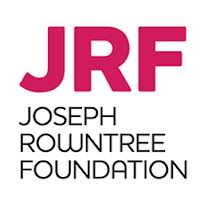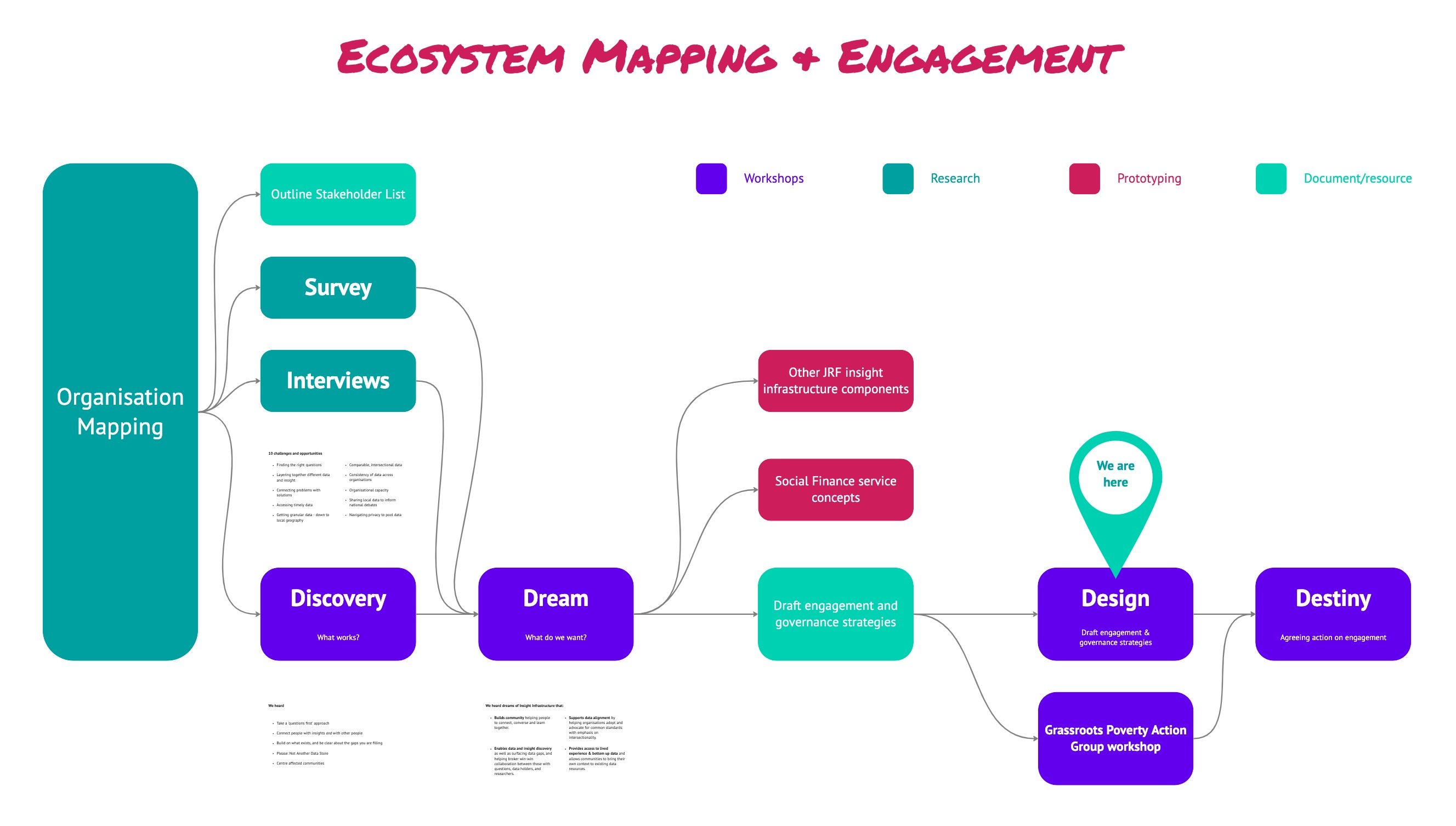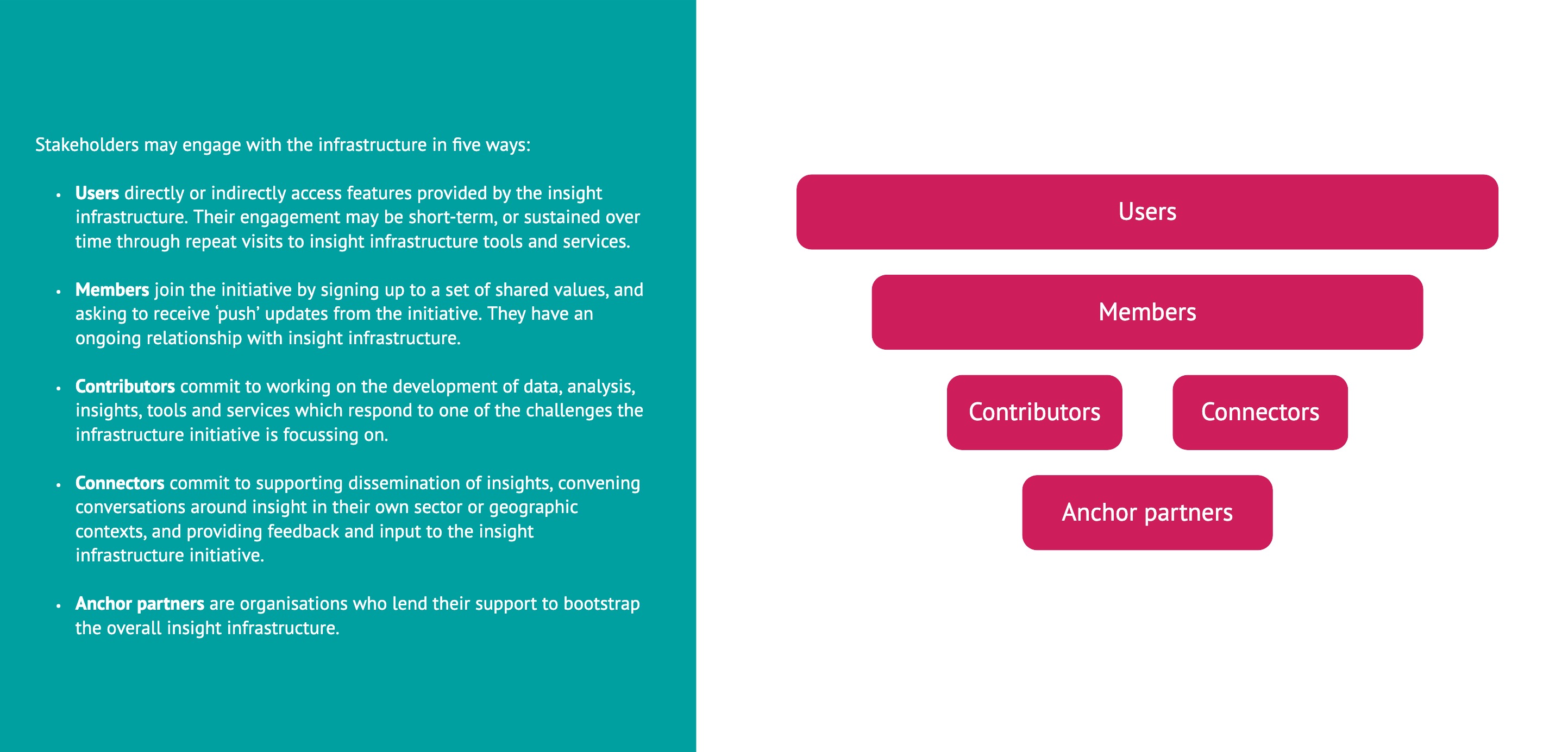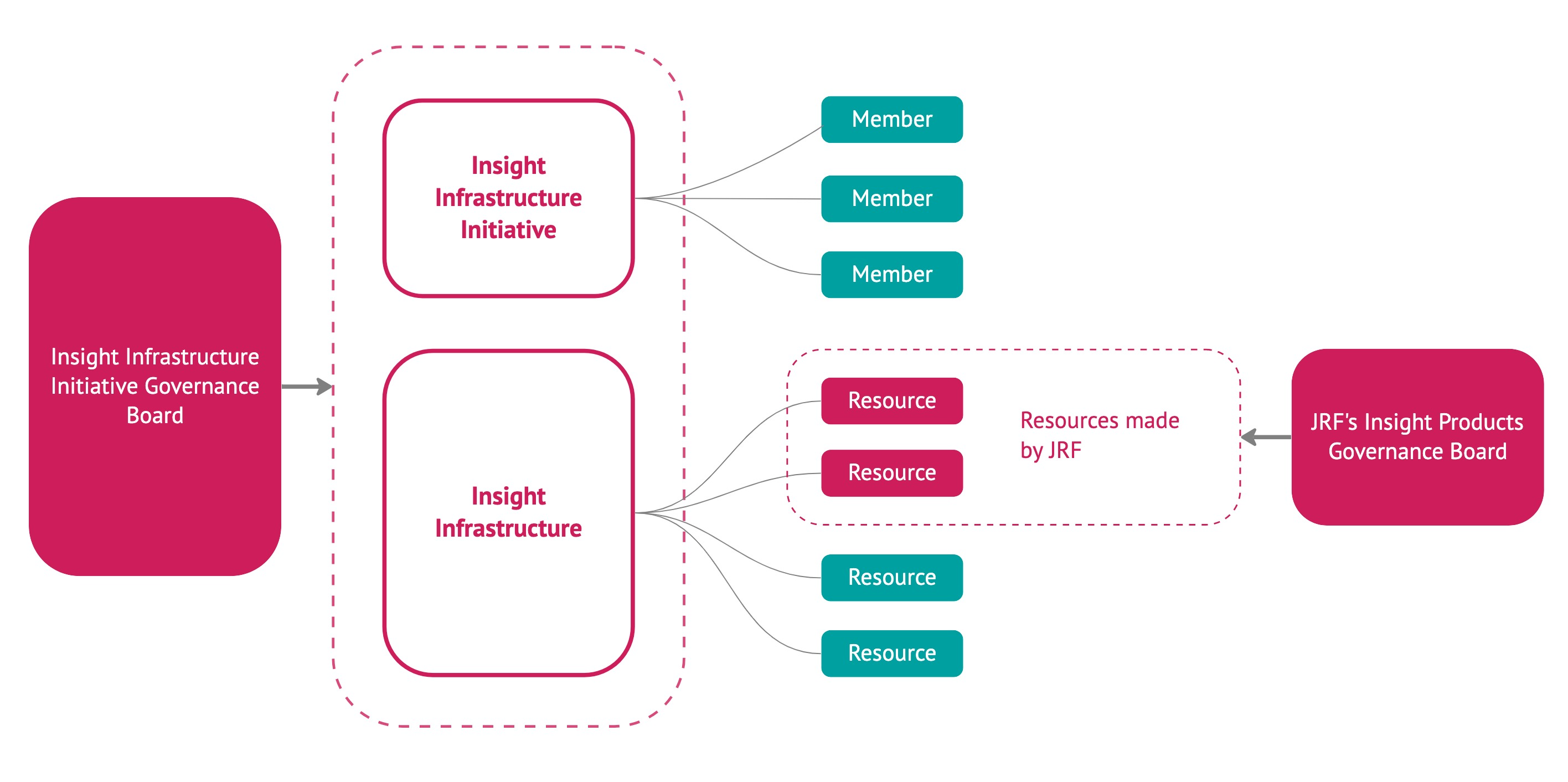

We recently hosted our penultimate JRF ecosystem mapping and engagement workshop to discuss our working draft of stakeholder engagement and the governance strategies for the insight infrastructure project.
We invited a selection of organisations we had previously worked with on the project to follow through our journey to this point, shared our key learnings from each stage and consulting on how the insight infrastructure might be framed as both a set of products, and a movement for better production and use of insight, and on early sketches of infrastructure and product governance boards.
Via a Miro board, participants were encouraged to add post-it note comments on summary slides of the drafts, attach ‘thumbs up’ to aspects that they agree with and ‘red flags’ to parts they may have had further questions about or were not comfortable with. These reflections on our current drafts and key takeaways are further detailed below.
 Image: ‘The journey so far’ presenting how the different workshops and research have informed the design of stakeholder engagement and governance strategies.
Image: ‘The journey so far’ presenting how the different workshops and research have informed the design of stakeholder engagement and governance strategies.
Stakeholder Engagement
Talk of an insight infrastructure can lead stakeholders to envisage a technical platform: seeing infrastructure as a ‘thing’. However, both existing JRF thinking, and early engagement with stakeholders, highlights the importance of understanding infrastructure building as a process. And, crucially, a collaborative process that catalyses:
- A movement for better sharing and use of data, evidence and insight to address poverty, social and economic exclusion;
- A community of stakeholders committed to the use, production and sharing of more robust, more accessible, and action-oriented insight; and
- An infrastructure of data assets, technologies, standards and guidance, capacity-building and convening space, that supports the movement, ecosystem and collaboration to thrive. We propose that JRF adopt a ‘movement first’ approach to developing the insight infrastructure, engaging potential stakeholders around a set of shared principles (draft forthcoming from JRF).
Most participants responded positively to the ‘movement first’ approach, whilst recognising that the infrastructure should evolve over time, and should not solely be a movement. Additionally, participants reflected that further thought and deliberation should be given to the draft principles and how they will be implemented in practice. Some principles put forward by participants included:
- Capacity building: To encourage and support other users to develop the skills and capacity to create and make use of insights
- Adding value: Not to duplicate efforts and waste resources
There was a rich discussion on the qualities of what could be considered ‘good’ data, which highlighted the importance of establishing good data practices in an insight infrastructure platform; such as being clear on what the data is describing, where it comes from, who can be contacted for queries, and what methods were used to extract this data. This allows for confidence in the data being received whilst making sure that there is a good level of diversity in the types of data the insight infrastructure hosts. The fact that different stakeholders may have different metrics and standards for data was brought up as a potential risk to engagement, but the workshop discussion encouraged co-creation of standards and deliberation over the data principles that the infrastructure would rely on.
 Image: Slide presenting different levels of stakeholder engagement covering users, memes, contributors, connectors and anchor partners.
Image: Slide presenting different levels of stakeholder engagement covering users, memes, contributors, connectors and anchor partners.
Key Takeaways
- People, places and communities affected by the issues addressed by the insight infrastructure are important stakeholders and should be included in any stakeholder engagement plan;
- We should think deeper about what we consider ‘trusted’ and ‘reliable’ sources of information and how this could be qualified or determined;
- Whilst stakeholder types may be useful for describing general aspects of stakeholder engagement, there should be a level of flexibility in the approach to meaningfully capture the diversity of stakeholders involved in the insight infrastructure project.
Governance
We put forward two interlinked governance processes: one for the insight infrastructure initiative as a whole, and one for the specific products that JRF is developing under the insight infrastructure initiative.
The Insight Infrastructure Initiative Governance Board (IIIGB) would be responsible for:
- shaping and advancing the guiding principles for both the insight infrastructure and its governance
- the overall strategic direction and key performance indicators of the insight infrastructure initiative, for example deciding on the focus for campaigns to grow the movement
- approving the recognition of particular resources as being part of the insight infrastructure, for example a specific dataset, model, or service
- identifying gaps in the insight infrastructure, and ways to fill them, such as by prioritising funding of the development of new datasets, models or services – these may be identified through commissioned research
- running the process to iterate on the principles and governance structure for the insight infrastructure initiative
It would have 12 members, including members with lived experience of poverty, and would meet quarterly. JRF should provide a secretariat for the board.
The Insight Product Governance Board (IPGB) performs gating checks on products and services produced by JRF as part of the poverty insight infrastructure by:
- reviewing and approving the proposed prioritisation for the development of insight infrastructure products by JRF, such as new datasets or services to be developed
- ensuring that these products meet guiding principles for infrastructure and resources, and any other principles that the IPGB chooses to put in place around JRF’s products
- approving the transition of products and services between stages of development: before starting discovery; to transition to each of alpha, beta and live release; and substantial iterations thereafter
- running the process to iterate on JRF’s governance of products that are part of the insight infrastructure
It would have 7 members, with expertise in product development, ethics and governance. It would meet regularly (initially likely to be once a month) and should have resources to carry out detailed technical assessments where required.
 Image: visual representation of the relationship between initiative and product governance.
Image: visual representation of the relationship between initiative and product governance.
The majority of the governance slides were met with ‘thumbs up’; however, participants also offered a number of useful points of critiques. The diversity of the Insight Infrastructure Initiative Governance Board (IIIGB) was a key talking point for all, with participants suggesting that:
- At least one member of the board should not be based in a national organisation;
- Members should cover different areas such as housing, mental health, employment;
- People with disabilities should have a quota for representation on the board.
Participants also recommended that further consideration should be given to JRF’s role as secretariat as there was a feeling that this could cause difficulties with buy-in from strategic partners and may risk the movement being framed solely as a JRF project. Additionally, concerns were raised about the extent to which people outside of the IIIGB would have the opportunity to bring things up, and whether the suggested format for meetings would be adequate.
In regards to the Insight Product Governance Board (IPGB), the main concerns raised were also related to inclusivity, as some were worried that the IPGB seemed like a very academic process. To combat this, it was suggested that it would be important to have a mix of technical and non-technical stakeholders on this board.
Key Takeaways
- The proposed policy of paying expenses/honaria ‘within reason’ will need to seriously consider people’s unique situations, and the level of compensation that is needed to truly support equity of participation;
- Having members of the IIIGB with lived experience at the governing level is as important as having members of the board with influence and scope;
- After deploying insight infrastructure products, there should be a proactive effort to search for both benefits and harms rather than waiting for communities to experience the harms.
In conclusion, the ‘Design’ workshop highlighted a number of areas to further develop the governance and stakeholder engagement strategies and provided very useful insights that we will instil into further iterations of our work.
Thank you to all the participants and organisations that were involved, your comments and reflections were invaluable.